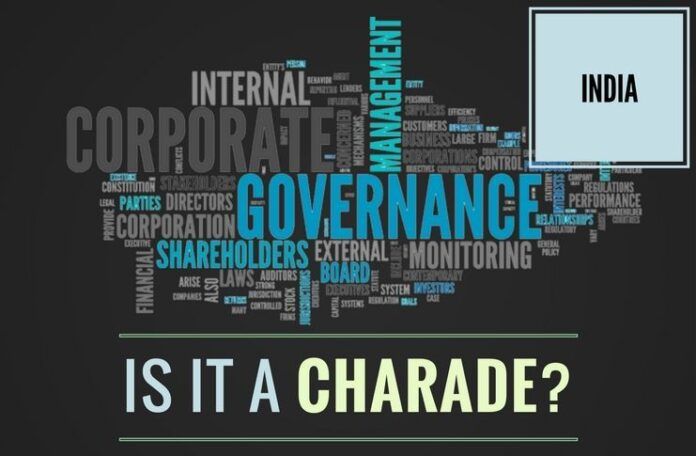
[dropcap color=”#008040″ boxed=”yes” boxed_radius=”8px” class=”” id=””]S[/dropcap]ince Independence, except for a brief period during the emergency, India has been a well functioning federal republic thanks to the effective functioning of its four pillars – executive, legislature, judiciary and the media. Executive governs and the legislature creates laws while the judiciary ensures that the executive and legislature does not usurp authority beyond constitutional limits. A vibrant and effective media serves as the watchdog.
At a time when there are high-pitched calls for a bigger private sector role in the economy, Corporate India has not covered itself with glory.
Likewise, a well functioning Corporation depends on four pillars – Management, Board of Directors, Auditors and Regulators. While Managements are responsible for day to day operations, the Board of Directors has a dual mandate of advisory and oversight. Auditors are gatekeepers who verify and assess financial performance. Regulators enforce laws in the books on corporations and punish wrongdoers. The financial binge of the past decade in our country brings to centre stage an all important and critical question– how are pillars of corporate governance functioning?
Unfortunately, all the perfume of Arabia cannot sweeten the stench of rotten corporate governance in India Inc. The C-suite at India Inc. is greedy and crooked, Board of Directors are inept and pusillanimous, Auditors are obsequious and callous while Regulators are oblivious and impotent.
[dropcap color=”#008040″ boxed=”yes” boxed_radius=”8px” class=”” id=””]T[/dropcap]he 2G scam and Non Performing Loans (NPL) provide a great insight into the unscrupulous and devious practices of company managements. There were fifteen companies bidding for spectrum most being “Who is Who” of telecom sector. All of them knew that the bidding process was rigged but none blew the whistle. Eventually when Supreme Court cancelled the licenses they all cried foul rather than accept their own failures. And as far as the NPL’s go, company managements continue to blame defaults on economic slowdown which is far from the truth in many cases. Independent audits have revealed that diversion of funds into activities unrelated to the purpose of loans as the primary cause of defaults. It is a travesty that affluent promoters appear on the list of willful defaulters.
Board of Directors establish a company’s strategic direction, its culture and tone, institute ethical policies, provide critical oversight of management and report periodically to shareholders and regulators about the state of affairs at the company. Regrettably, most board members including many independent directors are servile to management that appoints them. Several Board members are ill qualified to serve as Independent Directors but yet serve on more than 50 company boards there by violating the law as well as merely rubber stamping management decisions without serious consideration as to the merits of management proposals. Board members who are paid high compensation quite often abdicate their fiduciary duty to shareholders and openly favor company management. Many of the current Directors are not vociferous enough in asking shareholders to appoint at least one woman Director on the Board in order for companies to comply with the law.
Independent auditors appointed by shareholders have also failed in their duty to uphold basic corporate governance principles. Nepotism, diminishing professional standards and failure to report illegal acts for fear of losing the audit are plaguing the profession. Frequently, auditors acquiesce or go along with management in their desire to ‘cook the books’ and in many instances, have actively participated in or connived with management to falsify books of accounts, disguise related party transactions and mislead investors. Auditors have faced the wrath of regulators in foreign countries, paid humongous penalties, faced disbarment but the same auditors have never faced the full force of the law or have been let off lightly by our own regulators.
[dropcap color=”#008040″ boxed=”yes” boxed_radius=”8px” class=”” id=””]C[/dropcap]orporate governance in India is at best a sham and at worst a blame game. When a fraudulent activity comes to light, members of the Board resign en masse and pass the buck on to management and auditors. Auditors take a holier than thou attitude, mouth platitudes on responsibility of management in preparing financial statements and blame company finance department for misleading them. Management tends to blame either the lower-rung staff or external consultants. Meanwhile, shareholders who are left in the lurch during this farce turn to regulators for succor but are invariably always disappointed.
It is appalling but true that Indian regulators are clueless and impotent. Rather than enforce the law strictly, they either pursue their own agenda or look the other way at the behest of influential and powerful individuals and corporations. Reserve Bank of India (RBI), the banking regulator, has long protected the banks. Securities and Exchange Board of India (SEBI) has long defended promoters and has several times trampled the rights of minority shareholders and sided with powerful corporations. Insurance Regulatory and Development Authority (IRDA) protects the insurer (Corporations) while selling out the insured (Customers). The Company Law Board (CLB) is a toothless organization. Serious Fraud Investigation Office (SIFO) setup in 2003 following stock market scam is yet to prosecute a case successfully. More than 1000 “Prosecution Cases” have been filed by the agency that are either sub judice or languishing in designated courts. Other regulators like TRAI and ICAI have been ineffective and found wanting. It is beyond anyone’s guess and conjecture on why the Registrar of Companies (RoC) cannot go after shell companies whose existence is only to launder money or convert black money.
At a time when there are high-pitched calls for a bigger private sector role in the economy, Corporate India has not covered itself with glory. It is indeed a well known fact that politics and politicians must transform for our country to progress. Sadly, the same is true for India Inc also.
- Biggest Economic Accomplishment – Ending Crony Capitalism - December 13, 2019
- Mr. Rahul Gandhi must first become a Chief Minister - April 4, 2019
- How Congress lost Karnataka - May 15, 2018











I agree with the contention of corporate loot mainly by corrupt admin, H R and finance.
While the loot in public sector is generally suspected ,often reported and sometimes acted upon the private corporate loot is kept behind iron curtains, rarely reported even if suspected and almost no action taken except termination of few underlings.
The rot in corporate is much more than at top level. The corporate support functions (Admini, HR, Finance) are highly corrupt and try to make money out of both the company and the employees. Ironically while we talk about corruption in Govt., nobody talks about corruption in Corporate. Further employees do not have any grievance mechanism to raise voice against the ills in the company.
The Sham and Scam could not have been done with out the blessing of Politicians in this case the infamous Congress Party. Corporates are mere puppets and they derive their power and authority after adequately bribing the politicians. So root cause of this evil is our corrupt congress party. The NPAs in Bank is also another gift of the Corrupt Congress to the country. Additional 3500 crores were given to Vijay Mallya on the intervention of the then “Honest PM” Manmohan Singh after Mallya’s Kingfisher Airlines became bankrupt.
“Harward” Chidambaram is associated with all major scams in India right from Fair Growth Scandal in the year 1992. so it is the politicians who corrupt the society and the system.
I think the “corporate” structure is structured to encourage criminal activity.Moment owner dilutes his holding to majority share of 51%,he absolves himself of liabilities especially due to criminal acts.Unless laws are reframed,the situation will not improve.We will come across more scams